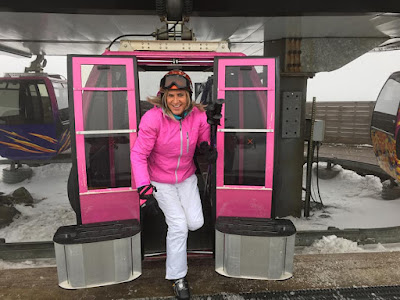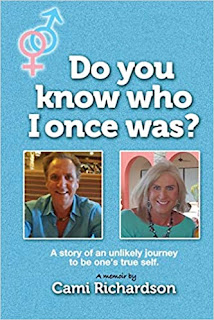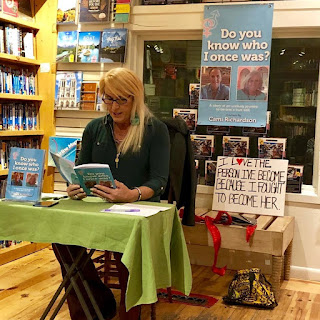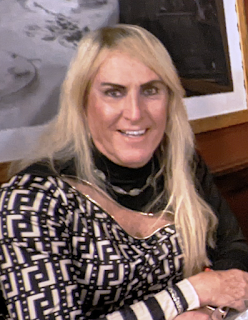Cami: Hi Monika! I am thrilled to be able to talk with you today. I hope our conversation will be fruitful for those listening. I have some interesting stories to tell about my life that I think many people will find enjoyable.
Monika: You are a New York lady, right? Could you say a few words about yourself?
Cami: Growing up in New York was an interesting experience. At the young age of 8 years old, I started to wear my mother's underwear and stockings and loved the feeling of wearing women's clothes. I was a good Italian Irish Catholic boy and could not explain why I was interested in wearing my mother's clothes and obviously I could not tell anybody. I hid my secret for 55 years before I finally came out at the age of 63 years old. I think being in a New Yorker actually helped me in that it toughened me as an individual so that I could handle what was to come when I finally did transition.
Monika: In the preface to your book, we can read that you had 60 jobs, occupations, businesses owned or management positions. How come so so many?
Cami: Well, I like change and most of the time my position changes were resulting in a betterment to my career or my financial situation. I actually now do what I call Cami talks where I speak to organizations, groups, or schools and I speak often about taking on risks in your life so you can reap the rewards. It does take a lot of risks for someone to be changing positions and things in their lives and I believe for me personally it has made me into the strong person that I am today.
Monika: You started your professional career as a firefighter...
Cami: That is correct. I started out as a volunteer firefighter at the age of 19 for the Arlington fire district in Poughkeepsie, New York. I was a college graduate but loved firefighting and took the test to be a paid firefighter and was fortunate to be the first one hired. It was a great career and to this day one that I truly miss. I rose to the ranks of municipal training officer for the district and then went on to become a Vermont state fire instructor after my wife and I move to Vermont. However, during that time frame, I did find myself cross-dressing a lot and often would wear women's undergarments underneath my uniform. I can't imagine what would have happened if I had been caught, but luckily I never was.
Monika: Where did you work after you retired from firefighting?
Cami: So I had a college degree that I was not utilizing when I was a paid firefighter and in 1983 I decided to move to Vermont and work for the Killington ski resort and started off as an internal auditor. I love the ski industry and enjoyed my positions there.
 |
| "I ran and ran for 55 years before I finally came out 24/7." |
Over the course of my career as the CFO, I raised over $900 million dollars in debt and equity to help finance the company's growth and acquisitions.
Monika: Given my own experience as well as that of many girls and women that I interviewed, I wonder whether we should be called ‘runners’ instead of transwomen. We run, run, and run away from our feminine self until it catches up with us. The only difference is how long we can run away…
Cami: I ran and ran for 55 years before I finally came out 24/7. I hid it over all those years with spurts of doing it more often than not. It was such a relief when I finally was able to come out full time and have that burden lifted off my shoulders of being in hiding and not living my true authentic self. I have absolutely loved my life since coming out as a trans woman in 2016. I am a huge advocate for the LGBTQ community, especially the transgender community, and serve on three different boards as well as organizing a huge trans event in Vegas every year.
I have written a memoir called, "Do you know who I once was?", which talks about my various careers and my experience in transitioning. I am finalizing another memoir called Foggy Goggles, which has a lot of great and funny stories from my careers as a firefighter and as a ski executive, and finally as an entrepreneur.
Monika: What inspired you to write your book?
Cami: My memoir encompasses some really interesting stories about my career and then my transitioning. I felt I could write a book that people would enjoy, laugh, cry, but mostly be inspired to do more in their life. I have no regrets about my life, what I did and what I didn't do. A memoir made sense to me.
Monika: Why did you choose Cami for your name?
Cami: OMG, it originally came about when I needed a name for the trans event I was going to in Vegas and because I had been considering myself as a crossdresser. I used the letter c and the letter d to come up with the name, which originally was Cami Desiree. When I came out full time and some of my close friends heard the name, one of them called me up and said we really think you need to drop the Desiree name as it makes you sound very slutty. So I did, and now I am just known as Cami.
Monika: When did you realize that you were not a crossdresser?
Cami: Interesting question. When I first started going to Vegas to the crossdresser/trans event, I never thought I would be anything other than a crossdresser as I had been for 50 something years. But it was becoming more and more obvious that I really enjoyed dressing and being a woman. And in 2015 when Caitlyn Jenner transitioned I told my wife that I wanted to figure out what was with me and I started going to therapy after months of talking my therapist said that she felt I was transgender and asked what are you going to do now? I went home, talked to my wife and a decision was made for me to go full time.
Monika: We all pay the highest price for the fulfillment of our dreams to be ourselves. As a result, we lose our families, friends, jobs, and social positions. Did you pay such a high price as well? What was the hardest thing about your coming out?
Cami: So I am a strong type A personality and have been able to weather the storm pretty well. But I still have lost many friends and family including my mother-in-law who after 25 years of loving me, has completely shut me off and refused to see me. The good news is is that I have made some incredible friends in the trans and LGBTQ community. As my wife has told me often, it's their loss, not yours. I feel like I am the same person that I always was and that they would never notice a difference, except they might find me to be a much kinder and gentler person.
 |
| "I eventually wound up at Sunday River ski resort in Maine and became the chief financial officer and senior vice president for an American ski company." |
Monika: Your wife is still at your side, though it t must have been very difficult for her...
Cami: Believe it or not, she is an amazing woman and displayed amazing courage in facing the reality of Tom becoming Cami permanently. She was always supportive and after some initial shock of hearing that I like to wear women's clothes. She accepted it and has been by my side to this day. I'm very lucky and I know it. She is a phenomenal woman who in her own right excels at whatever she does. I love her.
Monika: Are you satisfied with the effects of the hormone treatment?
Cami: After some initial different feelings in different parts of my body, I am generally satisfied. I can't say that I've noticed any significant physical changes, but I do believe I am a much more kinder and gentler person. I like myself and for years as Tom I didn't always like who I had to be when I was in charge of things. I'm retired now and I'm able to just enjoy my life, work as an advocate for the LGBTQ community and be my authentic self.
Monika: We are said to be prisoners of passing or non-passing syndrome. Although cosmetic surgeries help to overcome it, we will always be judged accordingly. How can we cope with this?
Cami: Great question. I have to face the reality that it's 68 years old. I'm not going to look like Mikaela Schiffrin but I am always dressed appropriately, I wear makeup, and for my age, I don't think I look too bad. In some cases, I think I can pass until people hear my voice. I've overcome the stigma of being too concerned and lived with the realities that I am, who I am, take it or leave it.
Monika: Do you remember the first time you saw a transgender woman on TV or met anyone transgender in person?
Cami: Over the years I would always see pictures of transgender women and wonder how that could be? Is it possible for a man to become a woman I wondered? It seemed like an unreachable and unthinkable thing to do. As I matured and understood more about gender identity, I began to realize that it is possible and that it takes courage to do so. I had never met a transgender individual until around 2010 and was struck by how beautiful she was and how inspiring she was. But I never believed I would make that step. It wasn't until Caitlyn Jenner in 2015 that I started to explore whether I wanted to do that as well. I made the decision and love every minute of being Cami.
Monika: Are there any transgender role models that you follow or followed?
Cami: I am a fan of Laverne Cox but I don't particularly follow trans women because they are trans. I am more impressed with women, cis or trans, that do great things in their lives. Those women are inspiring to me. I believe women have been held back and given fewer opportunities and that is simply unfair and unjustified.
 |
| Available via Amazon. |
Cami: I think we are still under attack and the murders that are committed each year on transgender women, especially black trans women, are very sad and unnecessary. Why can't we just live our lives like everyone else? Why are we judged? It's almost like we have gone back to the 1980s when the gays were persecuted and not able to live the life they wanted. They have come a long way and we still have a long way to go. There is still so much judgment and marginalization out there of our community. Laws are being passed in state after state here that repress trans youth in sports, healthcare, and their day-to-day lives. It has to end.
Monika: Do you like fashion? What kind of outfits do you usually wear? Any special fashion designs, colors, or trends?
Cami: I love fashion and always strive to look my best. As a 68-year-old person, I have to be realistic in what I wear. I live in Utah where the outside becomes part of our being and therefore my clothes choices will always reflect what I'm doing that day, and how it fits within my community. Wearing short mini skirts really doesn't work at all for anyone in Park City. My style is more athletic, especially since we live in a ski community.
I like to believe that I am a trans woman who makes a difference not only in appearance but the way I act. My personal mission is to educate and enlighten people about the transgender community by being myself every day and by being a good person who people can look at and see that I am just a normal person like everyone else.
Monika: By the way, do you like being complimented on your looks?
Cami: Of course, but it isn't the end-all. Sometimes I wonder if people are really sincere about their comments. I see myself in the mirror as a beautiful person and try to reflect that on the outside world by being a good person who is making a difference in my community. I will always do my best to look my best when I step out of my house.
Monika: Do you remember your first job interview as a woman?
Cami: Yes, but it was for a part-time job at a ski resort first as a greeter at the ticket booth and I did not find it difficult at all as the resort and the employees are very accepting. The second was as a customer service rep at the golf course at the same resort I had known the golf pro for years, and he again was also very accepting. I didn't find it difficult at all.
Monika: What would you advise to all transwomen looking for employment?
Cami: I would suggest that in any walk of life that as a trans woman you need to have confidence. Having a solid resume with good work history is a bonus regardless of your gender. I subscribe to the theory that one should walk into a job interview with a can-do attitude that is easily demonstratable to the interviewer. Be bold and proud. When asked about being a trans person, tell them what you feel you want to tell them and are comfortable with. But try to steer the subject back to what job you're applying for and how can you fit that role and help the company.
Monika: Are you involved in the life of the local LGBTQ community?
Cami: Yes, I am very involved. I serve on the board and as the treasurer of transgender education advocates out of Salt Lake City. I also co-chair The Park City LGBTQ task force which I help form over the past year to help those in the local community feel more comfortable and accepting.
I also serve on the board of Encircle homes out of Salt Lake City which has numerous LGBTQ youth homes throughout Utah. My role is to serve as an ambassador which would include giving talks and counsel to youth in our community.
Finally, up until this year I served as the lead organizer of a transgender outing in Las Vegas called Diva Las Vegas. We have over 150 women in attendance each year and it's just wonderful to be part of that community and help people who have never been out in public feel comfortable doing so for the first time.
I also do what I call Cami Talks. I talk to various groups, organizations, and high schools where I tell them my story and also answer any questions about being transgender. Last year I also did a TED talk called transgender by generations, which was done in cooperation with a 16-year-old trans male. We both answered questions and I thought it was very enlightening for people to hear the differences, especially with me being at the time 67 and him being 16.
 |
| "I felt I could write a book that people would enjoy, laugh, cry, but mostly be inspired to do more in their life." |
Monika: Could you tell me about the importance of love in your life?
Cami: I'm so fortunate to have a woman who continues to stand by my side for almost 29 years now. Our love has changed over the years and become even stronger. Sex is not important but friendship and having a partner that you can trust has taken its place. I think we all need the support of someone else and when it involves love and respect, it's a win-win for both parties.
Monika: What would you recommend to all transgender women that are afraid of transition?
Cami: My recommendations are solely based on my experiences which were that the moment I transitioned and came out 24/7 as a transgender woman, I felt like a huge burden was lifted off my shoulders. It is and always will be tough to hide from your true self, so I would encourage people who are on the fence or afraid to take the leap, take that risk and just do it.
Monika: My pen friend Gina Grahame wrote to me once that we should not limit our potential because of how we were born or by what we see other transgender people doing. Our dreams should not end on an operating table; that’s where they begin. Do you agree with this?
Cami: I don't believe I agree with this totally. I don't also believe that the end-all is having operations to be transgender. I think a lot depends on people's personalities and strength of conviction as to whether they need to go through with an operation or just live the life they want as a transgender woman.
Monika: Cami, it was a pleasure to interview you. Thanks a lot!
Cami: It has been a pleasure sharing my stories with you and your audience. As I've said before, my mission is to help educate and enlighten people about the transgender community and this is certainly one way to be able to make a difference. Thank you so much. I appreciate you and all you do for us.
All the photos: courtesy of Cami Richardson.
© 2022 - Monika Kowalska


No comments:
Post a Comment